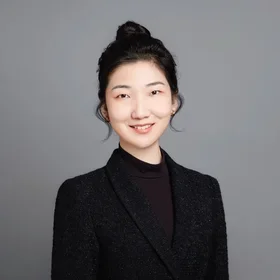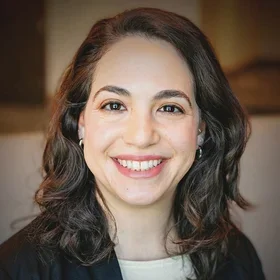After working as an assistant director of the Wick Poetry Center at Kent State University, Nicole Robinson found herself drawn to the collaborative storytelling work she did beyond academia in communities like prisons, schools, and hospitals. Robinson learned about the concept of narrative medicine and decided to deepen her practice with Columbia’s Narrative Medicine C.P.A. program. Today, Robinson’s work is based out of the Emily Cooper Welty Expressive Therapy Center under the Pediatric Palliative Care Division of Akron Children’s Hospital. She discusses her current role, highlights of Columbia’s program, and the advice she’d offer those looking to pursue a career in narrative medicine.
Tell us a bit about your career.
My narrative medicine career path really began before I knew the discipline existed. At first, I followed a somewhat typical education and career path for those who love poetry and literature. I earned a Bachelor of Arts in English Literature from Kent State University and a Master of Fine Arts in Creative Writing from Ashland University (concentrating in poetry). I served as the assistant director of the Wick Poetry Center at Kent State and taught in the department of English. My role at the poetry center included leading creative writing workshops in communities such as shelters, schools, prisons, and hospitals. I found myself most interested in the work of poetry and literature beyond the walls of academia.
How did you decide to pursue narrative medicine?
My decision to work in narrative medicine is often labeled as a career change, but I think of it more as a deepening of my career. I have always been drawn to the ways that reading and writing can teach us to slow down, to listen closely, and to connect to ourselves and the world around us more deeply.
After almost a decade, I resigned from KSU, learned more about narrative medicine, and enrolled in the program at Columbia. I am now the Narrative Medicine Coordinator at Akron Children’s Hospital, where I previously served as the writer-in-residence. I feel very humbled and privileged to do this work alongside a team of people that understand and advocate for the arts and humanities in healthcare.
I chose the program at Columbia because I wanted to learn from the founders of the discipline and understand how they created a space for it to emerge and grow.”
What drew you to the Narrative Medicine program at Columbia?
I am a person who wants to understand the roots of something, to know how it began, how it evolved, and how it continues to move forward. I chose the program at Columbia because I wanted to learn from the founders of the discipline and understand how they created a space for it to emerge and grow.
What was the most impactful part of the program?
It was the whole experience of entering a community of like-minded people who want to improve the lives of people seeking and delivering healthcare. I had the privilege to not only meet these people, but develop academic and professional relationships with them. I have been challenged to grow and cheered on by both faculty members and colleagues in this program. The support I receive from them continues to guide my way.
I bring several lessons from the program to my work every day. The movements and methods of narrative medicine learned in the program gave me a solid foundation on which to stand. Edgar Rivera Colón’s research course and Craig Irvine’s narrative ethics courses were two highlights. I apply the knowledge I gained from those courses on a regular basis.
There’s a small but mighty tribe of narrative medicine practitioners and facilitators doing this important work—find them and connect.”
What does your current role as the Narrative Medicine Coordinator at Akron Children’s Hospital entail?
I provide narrative medicine writing workshops and interventions for children, their families, and hospital staff. This means I have the privilege to use the arts and literature to engage with them about the narratives within and around them. The Pediatric Palliative Care division, led by Dr. Sarah Friebert, is filled with the most compassionate and caring people I know.
I also lead workshops for teens in our inpatient and outpatient behavioral health programs and for our residents and interdisciplinary teams throughout the hospital. I offer home visits for families receiving palliative care services and have the opportunity to work closely with our palliative care research team to help understand and better advocate for this work.
Do you have any advice for someone pursuing a career in narrative medicine?
Study the history of narrative medicine. It’s important to know the roots so that you can continue to honor them as you grow in the discipline.
Apply to a narrative medicine program. There are several throughout the country, but I am biased and would say apply to Columbia.
It’s also important to trust and have confidence in the work, even when the path to what Dr. Rita Charon calls “the clearing” feels rough. Most importantly, remember that you’re not alone in your work. There’s a small but mighty tribe of narrative medicine practitioners and facilitators doing this important work—find them and connect.
Learn more about Columbia’s Narrative Medicine C.P.A. and Master of Science programs.


